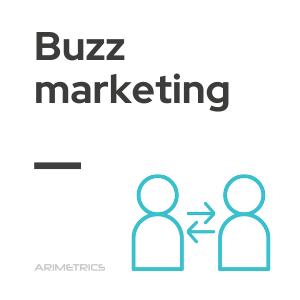
Definition:
The buzz marketing is a viral marketing technique that focuses on maximizing the word-of-mouth potential of a particular campaign or product, whether through conversations among consumers’ family and friends or larger-scale discussions on social media platforms. By getting consumers talking about their products and services, companies that employ buzz hope to grow their brand awareness through traffic growth and increase sales and profits for their products or services.
Buzz Marketing Examples
Buzz marketing has been used successfully by several well-known brands, creating memorable campaigns that generated a great impact. Below are some specific cases:
- ALS Association Ice Bucket Challenge (2014): This viral challenge was a massive social media phenomenon, where people around the world, including celebrities, videotaped themselves pouring a bucket of ice water over their heads to raise awareness of amyotrophic lateral sclerosis (ALS) and raise funds. The campaign not only generated millions of dollars in donations, but also achieved a global spread of the message.
- Coca-Cola and personalized bottles: Coca-Cola’s“Share a Coke” campaign, which consisted of printing popular names on its labels, encouraged consumers to search for bottles with their names or those of their friends and share photos on social networks. This initiative not only increased sales, but also generated a lot of user-generated content and online conversations.
- Red Bull Stratos (2012): Red Bull took buzz marketing to new heights with Felix Baumgartner’s stratospheric jump. The event was broadcast live and captured the attention of millions of viewers around the world. The campaign not only reinforced Red Bull’s image as a bold and adventurous brand, but also generated massive media coverage and conversations on social media.
- GoPro and its user content: GoPro has capitalized on buzz marketing by encouraging its users to share videos and photos captured with their cameras. By highlighting this content on its official channels, GoPro has created an active community that constantly generates and shares experiences, which has contributed significantly to the promotion of the brand.
- Starbucks and personalized Frappuccinos: Starbucks has launched several personalized beverage campaigns, such as the “Unicorn Frappuccino”, which encouraged customers to try them and share their colorful experiences on social media. These campaigns not only increased sales in the short term, but also generated a large volume of content shared by users.
Buzz Marketing and Influencers
Online buzz marketing is typically driven by influencers, or early users of a product, who are willing to share their thoughts on the product and proactively start conversations about it.
Influencers, in particular, have built a solid presence on social networks such as Instagram, Facebook and Twitter. Thanks to their credibility and the connection they have with their followers, they have a great capacity for influence.
By fostering authentic and enthusiastic discussions, these opinion leaders can amplify the reach of a campaign, generating a significant impact on product perception and popularity.
Buzz Marketing vs Astroturfing
Although buzz marketing and astroturfing may seem similar in their goal of generating attention and conversation, they differ significantly in their methods and ethics.
- Buzz Marketing is a marketing strategy that seeks to generate conversation and excitement around a product or service organically. It focuses on word of mouth and creating content that people genuinely want to share. The goal is to increase visibility and interest in an authentic way.
- Astroturfing, on the other hand, refers to a deceptive practice in which a false impression of popular support or consensus is created. This is achieved by creating false comments, reviews or testimonials that appear to be from real users, but are actually generated by the company or its agents. Astroturfing is generally viewed negatively because it manipulates public perception and can damage a brand’s credibility if discovered.
